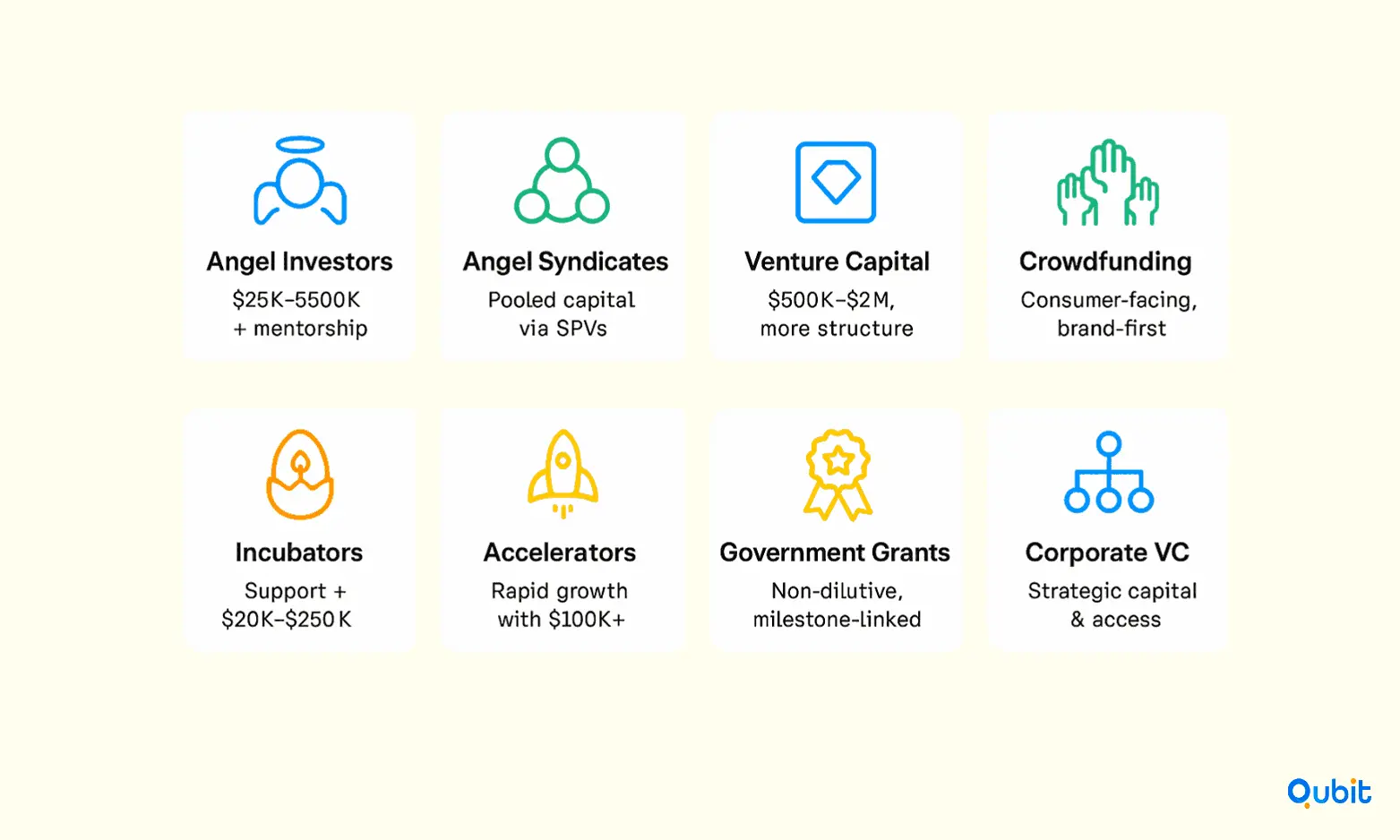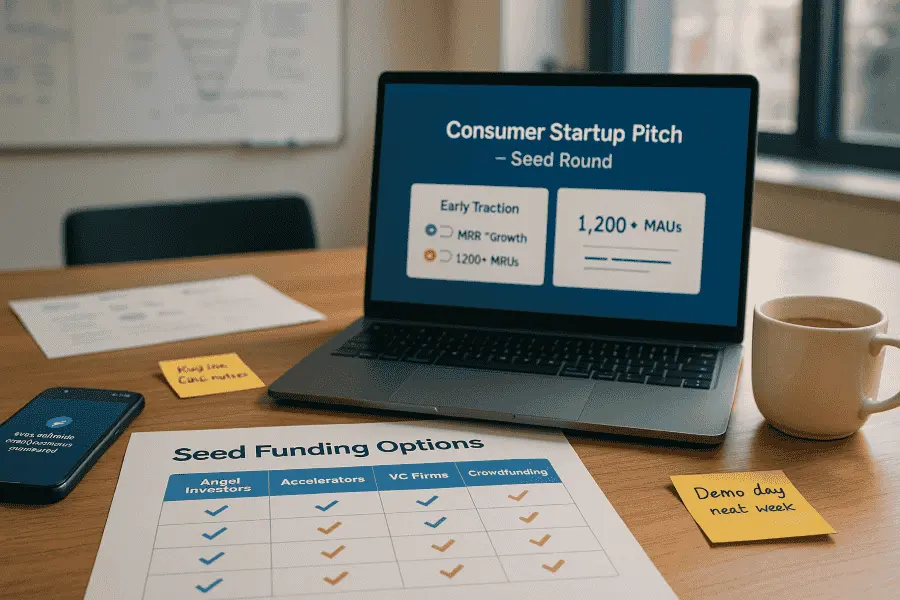The consumer startup ecosystem offers diverse funding pathways, from government schemes providing non-dilutive capital to specialized venture funds focused exclusively on consumer technology. They typically invest in early-stage rounds like seed and Series A, providing funding from $500K up to $10 million for promising consumer startups with demonstrated market traction.
This comprehensive guide explores the full spectrum of seed funding options available to consumer startups, providing practical insights for navigating the complex funding landscape and securing the capital needed for growth.
Understanding Seed Funding: The Foundation of Startup Growth
Seed funding is the initial capital investment provided to new businesses or startups to help them establish operations and begin their growth trajectory. Unlike later-stage funding rounds, seed investments typically occur when companies are still developing their products, validating market fit, and establishing basic business operations.
For consumer startups, seed funding serves multiple critical purposes:
- Product development and prototyping to create market-ready offerings
- Market research and validation to confirm consumer demand
- Initial team building to assemble core talent
- Technology infrastructure acquisition for operations
- Early marketing campaigns to build brand awareness
The typical seed funding round in 2024 averaged $2.5 million in the United States, though amounts can range from tens of thousands to several million dollars depending on the startup's needs and market opportunity.
Strategic capital planning looks very different when CAC, retention, and liquidity are pulling in opposite directions, something the funding guide for consumer & marketplace startups breaks down with clear benchmarks.
Pre-Seed vs. Seed Funding: Understanding the Distinction
Before exploring specific funding options, it's essential to understand the difference between pre-seed and seed funding stages.
Pre-seed funding represents the earliest stage of financing, often involving minimal paperwork and informal arrangements. This stage typically includes:
- Personal savings from founders (bootstrapping)
- Loans from friends, family, or supporters
- Small amounts to validate initial concepts
- Funding based primarily on the founder's vision rather than proven metrics.
Seed funding, conversely, represents a more formal investment stage where startups have typically developed:
- A refined business model
- Initial market validation data
- Early product prototypes or minimum viable products
- Basic financial projections and growth plans
Primary Seed Funding Sources for Consumer Startups

1. Angel Investors
Angel investors are high-net-worth individuals who invest their personal capital in early-stage startups, often bringing valuable expertise alongside funding. These investors, frequently former entrepreneurs themselves, typically focus on pre-seed and seed-stage investments.
Key Characteristics:
- Must be accredited investors with $1 million net worth or $200,000 annual income
- Invest amounts ranging from $25,000 to $500,000 per deal
- Provide mentorship and industry connections beyond capital
- Often invest in sectors they understand from personal experience
Advantages for Consumer Startups:
- Expertise and guidance from experienced business professionals
- Access to established business networks and potential partnerships
- Flexible investment terms compared to institutional investors
- Validation and credibility boost for future fundraising rounds
2. Angel Syndicates
Angel syndicates represent groups of angel investors who pool resources through special purpose vehicles (SPVs) to make larger collective investments. This approach allows individual angels to participate in deals that might otherwise be beyond their individual investment capacity.
Benefits Include:
- Access to larger funding amounts than individual angels
- Diversified expertise from multiple seasoned investors
- Shared due diligence process reducing individual risk
- Enhanced networking opportunities across multiple investor relationships
For consumer startups, warm intros are just the surface, who you pitch matters. These angel investors focused on consumer tech often bring operating experience and market insight.
3. Venture Capital Firms
While traditionally focused on later-stage investments, many venture capital firms now participate in seed-stage funding for promising consumer startups. VC involvement at the seed stage often indicates strong growth potential and can facilitate future funding rounds.
VC Seed Investment Characteristics:
- Larger investment amounts, typically $500,000 to $2 million
- More formal due diligence processes
- Board representation or observer rights
- Clear expectations for growth metrics and milestones
4. Crowdfunding Platforms
Crowdfunding has gained significant popularity as a democratized funding mechanism that allows startups to raise capital from large numbers of small investors. This approach is particularly effective for consumer products with broad market appeal.
Major Crowdfunding Platforms:
- Kickstarter: Reward-based crowdfunding for product launches
- Indiegogo: Flexible funding options with global reach
- Crowdfunder: Equity crowdfunding for accredited investors
- Republic: Accessible equity crowdfunding for non-accredited investors
Advantages for Consumer Startups:
- Market validation through consumer pre-orders
- Marketing exposure and brand building
- Minimal equity dilution (for reward-based platforms)
- Direct customer feedback and engagement opportunities
Considerations:
- Campaign success requires significant marketing effort
- Public visibility of funding attempts
- Platform fees and payment processing costs
- Potential intellectual property exposure
5. Startup Incubators
Incubators provide comprehensive support ecosystems for early-stage startups, combining funding with mentorship, office space, and business development resources. These programs typically last 3-6 months and culminate in demo days where startups pitch to investor audiences.
Incubator Benefits:
- Structured mentorship from experienced entrepreneurs
- Access to professional networks and potential customers
- Office space and basic business infrastructure
- Peer learning opportunities with other startup founders
Funding Structure:
- Typically provide $20,000 to $250,000 in exchange for 5-10% equity
- May include additional funding opportunities through associated investor networks
- Often structured as convertible notes or SAFE agreements
6. Startup Accelerators
Accelerators focus on rapidly scaling startups that already possess minimum viable products or early market traction2. These programs are more intensive than incubators and typically last 3-4 months.
Notable Accelerators:
- Y Combinator: The most prestigious program, providing $500,000 for 6% equity
- Techstars: Offers $120,000 investment plus extensive mentor network
- 500 Startups: Global accelerator with consumer product focus
Accelerator Advantages:
- Intensive growth-focused programming
- Access to elite investor networks
- Brand credibility and validation
- Alumni networks for ongoing support
7. Government Funding Programs
Government initiatives provide non-dilutive or low-cost funding options for qualifying startups. In India, the Startup India Seed Fund Scheme (SISFS) exemplifies government support for early-stage companies.
SISFS Program Details:
- Up to ₹20 lakhs as grants for proof of concept and prototype development
- Up to ₹50 lakhs for market entry and commercialization through convertible instruments
- Sector-agnostic approach welcoming all startup types
- No mandatory physical incubation requirements
Program Advantages:
- Minimal or no equity dilution
- Government credibility and validation
- Structured milestone-based funding release
- Access to additional government resources and networks
8. Corporate Venture Capital
Large corporations increasingly invest in startups through dedicated venture arms, seeking strategic partnerships and innovation opportunities. Corporate investors often provide more than capital, offering market access, distribution channels, and technical expertise.
Corporate VC Benefits:
- Strategic partnerships and customer relationships
- Industry expertise and market insights
- Potential acquisition opportunities
- Access to corporate resources and infrastructure
Considerations:
- Potential conflicts of interest with competitors
- Strategic limitations on business model pivots
- Longer decision-making processes
- Complex relationship management requirements
Funding Structure Options: Convertible vs. Equity
Seed funding can be structured through various financial instruments, each with distinct implications for founders and investors.
Convertible Notes
Convertible notes represent debt instruments that convert to equity in future funding rounds. These structures postpone company valuation discussions until later rounds when more data is available.
Key Features:
- Interest rates typically 2-8% annually
- Discount rates of 10-30% for conversion to future equity
- Valuation caps protecting investor conversion rates
- Maturity dates of 18-36 months
SAFE (Simple Agreement for Future Equity)
SAFE agreements, popularized by Y Combinator, provide simplified convertible structures without debt characteristics. These instruments convert to equity in future qualified financing rounds.
SAFE Advantages:
- No interest accrual or maturity dates
- Simplified legal documentation
- Founder-friendly terms
- Faster negotiation and closing processes
Priced Equity Rounds
Priced equity rounds establish specific company valuations and issue preferred stock to investors4. While less common at seed stage, these structures provide clarity for all parties regarding ownership percentages.
Strategic Considerations for Consumer Startups
Timing Your Seed Funding Approach
The optimal timing for seed funding depends on several factors:
Ideal Conditions Include:
- Clear problem-solution fit validation
- Early customer traction or pre-orders
- Foundational team assembly
- Basic financial projections and business model clarity
- Intellectual property protection for key innovations
Choosing the Right Funding Mix
Most successful consumer startups utilize multiple funding sources rather than relying on single investors. A typical approach might include:
- Initial friends and family funding for early validation
- Crowdfunding campaigns for market validation and customer acquisition
- Angel investors for strategic expertise and networks
- Accelerator programs for rapid scaling and investor introductions
The tradeoff between speed and control often defines your early growth path, and bootstrapping vs external funding for consumer apps dives straight into that tension.
Due Diligence Preparation
Successful seed fundraising requires thorough preparation:
Essential Documentation:
- Executive summary and business plan
- Financial projections and unit economics
- Market research and competitive analysis
- Product demonstrations and user feedback
- Team backgrounds and relevant experience
- Legal structure and intellectual property status
Valuation Considerations
Seed-stage valuations typically range from $1 million to $10 million for consumer startups, depending on:
- Market size and growth potential
- Team experience and track record
- Product differentiation and competitive advantages
- Early traction metrics and customer validation
- Technology or intellectual property value
Best Practices for Seed Fundraising
Building Investor Relationships
Successful fundraising begins long before formal pitching:
- Attend industry events and startup meetups regularly
- Develop authentic relationships with potential investors over time
- Seek warm introductions through mutual connections when possible
- Provide regular updates on company progress and milestones
Crafting Compelling Pitches
Effective seed-stage pitches focus on:
- Problem clarity and market size validation
- Solution differentiation and competitive advantages
- Team credibility and relevant experience
- Traction evidence through metrics or customer feedback
- Clear funding use and milestone achievement plans
Managing the Fundraising Process
- Run coordinated processes with multiple potential investors
- Set clear timelines and stick to announced deadlines
- Maintain transparent communication throughout discussions
- Negotiate terms carefully while maintaining founder-friendly structures
Common Pitfalls and How to Avoid Them
Overvaluation Risks
Setting unrealistic valuations can derail fundraising efforts and create challenges for future rounds. Focus on raising adequate capital at reasonable terms rather than maximizing valuation.
Inadequate Due Diligence
Failing to properly vet potential investors can lead to problematic relationships. Research investor backgrounds, portfolio companies, and reputation within the startup community.
Insufficient Financial Planning
Underestimating capital requirements often forces premature fundraising or emergency financing. Plan for 18-24 months of runway with specific milestone achievements.
Neglecting Legal Protection
Proper legal documentation protects both founders and investors. Invest in qualified legal counsel experienced with startup financing structures.
Future Funding Considerations
Seed funding success sets the foundation for subsequent funding rounds. Consider how current funding decisions will impact:
- Series A readiness and investor requirements
- Board composition and governance structures
- Employee equity pools and talent acquisition
- Strategic partnerships and market expansion opportunities
Conclusion
The seed funding landscape for consumer startups offers numerous pathways to secure the capital necessary for early-stage growth. From traditional angel investors and venture capital firms to innovative crowdfunding platforms and government programs, founders have unprecedented access to funding sources.
The key lies in matching your startup's specific needs, stage, and goals with the most appropriate funding sources while maintaining focus on building sustainable, scalable businesses that deliver genuine value to consumers. With proper preparation and strategic execution, seed funding becomes not just a financial milestone but a launching pad for long-term entrepreneurial success.
If you’re ready to shortcut that marathon, our Fundraising assistance will help you lay out how to focus on quality, not just quantity. Connect Today!
Key Takeaways
- Diversify your funding approach: Most successful consumer startups combine multiple sources like angel investors, crowdfunding, and accelerators rather than relying on a single funding type.
- Timing is critical: Raise seed funding when you have clear problem-solution fit, early customer validation, and a foundational team rather than just an idea.
- Choose investors who add value beyond capital: Angel investors and accelerators provide mentorship, networks, and industry expertise that can be more valuable than the money itself.
- Government programs offer non-dilutive options: Schemes like India's SISFS provide up to ₹20 lakhs in grants and ₹50 lakhs in convertible instruments with minimal equity dilution.
- Preparation determines success: Thorough due diligence preparation, realistic valuations, and relationship building are more important than perfect pitch decks.
Frequently asked Questions
How much seed funding should a consumer startup raise?
The typical seed round averages $2.5 million in 2024, but amounts vary based on your business model and market opportunity. Focus on raising enough capital for 18-24 months of runway while achieving specific milestones that position you for Series A funding.






